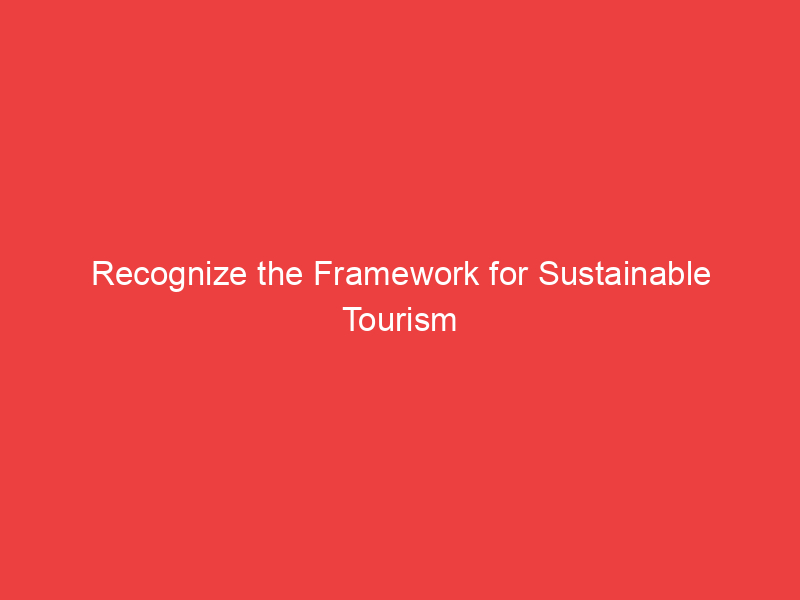Having experienced tremendous expansion in recent decades, tourism has gained prominence as one of the key pillars for the growth of the nation’s economy and for social well-being. But along with increased social and economic well-being, this sector’s carbon footprint has also increased significantly as a result of this rise. In fact, among other sectors of the tourism sector, the hotel industry’s unchecked and unsupervised growth has had and continues to have direct harmful effects on the environment as well as indirect effects on the welfare and health of the local community. Tourism is one of the economic sectors that is currently under the most pressure to stop this trend and become carbon neutral because it has had a significant carbon footprint for a long time. Even if steps in this direction have already been taken, there are still a lot of obstacles to be addressed, especially on a local level, for tourism to effectively realize its potential for economic growth and social welfare.
The hospitality sector’s new international standard, ISO 21401:2018, was created to satisfy the need for the development of sustainable tourism. It helps the industry lessen its environmental effects and achieve Sustainable Development Goals and is in line with the UN 2030 Agenda for Sustainable Development. The standard can be simply included in current ISO management systems because it is built on the same structure as all other ISO management system standards. Biodiversity, energy efficiency and waste management, water use and emissions, work conditions, and accident avoidance are among the topics covered by ISO 21401. It also emphasizes the effects of tourism on society and the economy. The ISO 21401 certification is a ground-breaking effort to guarantee sustainability assurance, offering businesses independent verification across their entire sustainability footprint, fully informed employees thanks to ISO 21401 auditor training, authenticating end-to-end commitment to sustainability, and fostering stakeholder trust as well as corporate value.
The ISO 21401:2018 Tourism and Related Services Sustainability Management System for Hospitality Facilities Requirements specifies the integration of economic, social, cultural, and environmental hospitality facilities as part of a framework for sustainable tourism. All initiatives geared toward sustainable development ought to follow a similar path, starting with a long-term goal, then implementing decision-making processes, developing workable solutions, identifying and assessing new issues, examining important facts and trends as they emerge, and finally compiling the resulting fundamental data. With the help of these steps, a sound strategy can be developed, one that will introduce sustainability into the way tourism is currently conducted in the place of choice. Examples of objectives included in a framework for sustainable tourism include:
- Local prosperity from employment— Increase the number of employments that is available to support the tourism industry, paying attention to wages, the level of service provided, and workers’ abilities without regard to their race, age, or physical condition.
- Social balance— Make sure that the revenues from tourism are distributed fairly so that they can be used to create more jobs in the area and improve services for the underprivileged.
- Cultural wealth— to conserve the historical and conventional local culture, take action (for instance, establish a museum or provide tours of cultural destinations).
- Clean environment— reduce the amount of trash generated by visitors and the amount of pollution that is released into the air, water, and soil
To implement a sustainability management system in lodging facilities for the tourism industry, ISO 21401 provides the necessary environmental, social, and economic standards. The factors that lodging businesses can exercise control and influence over are covered by the ISO 21401 standard. Any lodging company that desires to regardless of kind, size, or location, adhere to the ISO 21401 standard must:
- Implement, maintain and improve sustainable practices in their operations;
- Ensure conformance with its defined sustainability policy.
The ISO 21401 standard outlines the financial, social, and environmental conditions necessary to make the board framework maintainable for the benefit of tourists. Human rights, tourist safety and well-being, environmental protection, water and energy use, waste management, and other issues are addressed, which helps the local economy grow. Having a positive impact on the environment and local culture while promoting future employment for residents of the area is a goal of the travel industry. Making sure that growth might also be a positive experience for residents, travel industry groups, and travellers themselves is the objective of managing the travel sector. Human rights, labourer and visitor prosperity and security, natural conformation, water and resource use, and waste age are only a few of the concerns that the quality focuses on.

